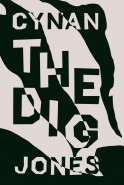
Book Review: The Dig by Cynan Jones

The Dig
A Novel by Cynan Jones
Coffee House Press, April 2015
$15.95; 176 pp.
Reviewed by Daniel Pecchenino
The Welsh countryside in Cynan Jones’ excellent novel The Dig is far from idyllic. The sunlight is “thin,” “a powder” that “come[s] tipping in through the slats of the barn,” but only “for a moment.” The earth is sodden, and “shattering[s] of rain” frequently fall on shed roofs. Animals don’t frolic; they run or burrow for their lives, nearly die giving birth (sometimes to already dead, grotesque offspring), and kill one another gleefully. Even the beasts of burden are more beastly than we’d like: the events in The Dig, as in William Faulkner’s late masterpiece The Mansion, follow a young wife getting kicked and killed by a horse, leaving behind a stunned, disconsolate husband.
The comparison with Faulkner’s work is worth considering further, even if one wouldn’t think so when first looking at Jones’ slim, sparse book. While whole pages of The Dig have fewer words than some of Faulkner’s dependent clauses, both Jones’s novel and most of Faulkner’s fiction challenge the always-fashionable idea that complex, interesting stories are about cosmopolitans wrestling with the tyranny of choice. There is no quirky new lover, great job, or middle-class adventure on the horizon for Daniel, the widower and one of two central characters in The Dig. Rather, he lives the grinding routine of a sheep farmer who barely sleeps as he struggles to understand that his wife, a woman he’d known since childhood and who worked alongside him in the earth, is actually dead.
The complexity in The Dig, as in Faulkner’s As I Lay Dying, comes from Jones allowing us to inhabit this struggle directly. When he is reminded of the never-started projects his wife wanted him to work on, Daniel can’t “think of when he had wasted time,” yet also doesn’t have a great sense of what stopped him from doing what his wife asked. “Somehow time had gone too fast,” is the best the he can come up with. Each day is both racing by and part of the “not dead… not even past” past Faulkner famously theorized. It is more than simple longing when Daniel thinks: “It was impossible that she was dead because his feelings for her had not diminished at all.” Having lived within Daniel’s thoughts, we know he can’t come back from this kind of magical thinking, and that he’s doomed for it all to go “too fast” until it’s all over.
The other main character in The Dig is never named. He is simply “the big man,” a badger-baiter, dog breeder, and rat exterminator living in a house surrounded by “many dumped engines and tires and the wastage of vehicles and machines.” We know little about him other than that he’s an ex-convict trying not to get sent back to jail. While it would be easy to see him as a simple dark mirror of Daniel (one man brings animals into the world, the other kills and tortures them for profit), his pride in his dogs and his desire to breed them to perfection make his opacity all the more chilling. He’s not an animal, but a reminder that the technologies we create to make our lives better (including moral codes) can quickly become useless junk when survival is at stake. Kill or be killed is all that matters.
Although the two stories don’t come together until the very end of the novel, on several occasions the men hear each other off in the distance. Yet they have no idea what these sounds mean relative to where the plot is going. And this is why the rural setting is so crucial, and frankly underutilized in novels attempting to examine existential terror. The Dig really has no plot until one looks back on it. Instead, the book is an open field, but one where potential trouble exists unseen off in the woods or just over a rise. Everything is a horse-kick, a too-loud pick strike, one nosy cop away from going sideways, and there’s no one there to help or even see how it all plays out. In the noise of the city, it’s easy to forget how important each small gesture is because we can convince ourselves that everything gets drowned out and that we’re safe in the crowd. Daniel and the big man are reminders that whoever, wherever, and whatever we are, we aren’t safe.
Daniel Pecchenino lives in Hollywood and is on the Writing Program faculty at the University of Southern California. He is the Assistant Reviews Editor at Los Angeles Review, and his poetry and criticism have appeared in Gravel, Two Hawks Quarterly, Borderlands: Texas Poetry Review, and other publications.

[…] this, Jones published The Dig (which I reviewed here), Bird, Blood, Snow (2012, Seren Books), and two books now being released in America for the first […]